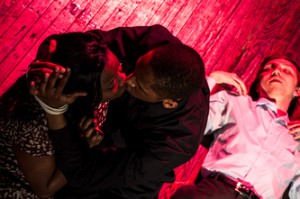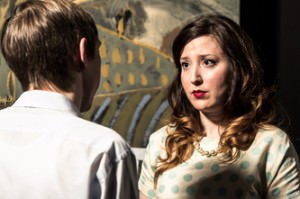Be prepared to bring your imagination along for the journey as Strand Theater Company of Baltimore presents Blood Bound and Tongue Tied. Directed by Lindsay Gentry, area playwright Jacqueline E. Lawton’s work is brought to life in its world premiere. The concept behind the show is a re-visitation to the Greek classic Oedipus. Only this show has Jocasta as a young black woman in depression-era Texas, who passes for white in the big city and goes on to marry wealthy and successful Laius. But when the couple becomes pregnant her racial identity will not remain hidden. Or will it? A desperate lie launches a catastrophic wave of bloodshed. The concept that drives the play is compelling, essentially a semi-modernization of Oedipus.

The problem herein lies with everything this production asks its audience to believe. The central conceit of the show is that Jocasta (Kelli Wright) is a black woman who is able to pass for a white woman in big city society. And like all disguises that are key focal points in tragedies this concealed lie must also come unraveled. But at its unraveling point there is no transformation because the actor was never made to look as she was portrayed. While Wright is a talented emotional actress, who speaks with the charm and poise of a high society white woman from the south in that time period, the director chose to do nothing physically to indicate that she was anything other than a dark skinned black actress. Even a simple gesture like long sleeved shirts, gloves or full length skirts or a wig appropriate to the time setting would have helped to push this illusion. While Wright did don a wig – it was not a clear defining choice to separate herself from the white woman she was meant to be portraying, and it wasn’t even from the time period.
This concept could have been overlooked and the audience could have been expected to connect the dots had the audience not been forced to imagine the setting in their minds. It wasn’t that there was no setting, for the stage had plenty of props and there were costumes but there was nothing aside from the text to clearly indicate that the characters were anywhere other than the present day. This was confusing as Jocasta often appeared in modern above-the-knee checkered skirts and low cut tops while Jenna (Ann Turiano) appeared in simple summery dresses patterned in polka-dot. Without key indicators to really help define where the play is happening and in this case, when; the importance of the author’s text gets drowned out.
If director Lindsay Gentry were going for a modern fusion with this work, the way Shakespeare is often interpreted – with modern sets and costumes but the original language of the text – she fell short because of the underdeveloped choices in scenery and costumes. While Scenic Designer David Cunningham painted beautiful murals with a hazy outline quality – they all appeared rather modern, with vibrant colors, not really indicating depression-era anywhere, let alone Texas.

The play would have been saved had it not been for the confusing intermission. The program stated that the show runs 90 minutes with no intermission – but about an hour into the show the actors leave the stage after a critical scene and the lights come up. There was extreme confusion among audience members as to whether or not this was the end of the show until there was an announcement that it was an intermission. After the play resumed – the momentum that had been building up between the characters was lost and sluggish, dragging the play through to the end.
The first half of the show was spent ramping up the excitement between the secret meetings of Jocasta and her brother Creon (Morgan Mosley) as well as the love story progression between Wright and Laius (Chris Knight) and it moved with fluidity and speed. But after the intermission the quick-flash scenes were dragging and the half hour that it took to wrap the play up felt longer than the whole first act which took an hour. It was a poor directing choice to sever the connection between this fast-paced build up, ultimately leading to a clunky and agonizingly slow ending.
Despite these flaws, if you can move past the fact that you have to do most of the image work in your own mind, the acting is rather impressive. Jocasta, Creon, and Oedipus have all mastered the vocal restraint of expressing anger without shouting at the top of their lungs. These three actors all have scenes where they whisper through gritted teeth in hushed tones but the anger is more than apparent, seething through their pursed lips to the point of being frightening.

Laius shows us a range of emotions from doting upon Jocasta to expressing his anger at rapists later in the show. A stunning and compelling moment comes in his horribly anguished confession to Jocasta about his inability to defend a Negro rapist. Short of being on his knees – his soul gushes forth with disgust and terror, the black hatred flowing from his heart over his lips, his eyes wide with tears. Knight has several moments with this intensity, all played out through his eyes; those wide pitiful eyes that he turns on Oedipus (Derek Cooper) in one of the dream sequences, begging to recognize his own son. Knight’s chemistry with Jocasta is the epitome of young love, putting all of his emotions on the line for her and Wright responds with heartfelt passion also reflected in her eyes and facial expressions.
One of the most intense moments in the production occurs when Jocasta is recounting the rape incident to Laius. While the couple stands off to one side of the stage, stricken with terror and disgust – respectively in the center of the stage stand Oedipus and Jenna bathed in sinister red light. As Wright continues to relive the nightmare, terrifying sorrow streaking across her face as her voice cracks, Turiano begins to reenact the incident only instead of a rape she and Cooper reflect a sultry wanton display of intimacy between two people. These two complete opposite portrayals creates a stunning if harrowing contrast of what is happening on the stage and is the most compelling moment of the show.
Running Time: 90 minutes with one intermission.
Blood Bound and Tongue Tied plays through April 7, 2012 at Strand Theater Company – 1823 N. Charles Street, in Baltimore, MD For tickets, call (443) 874-4917 or purchase them online.




